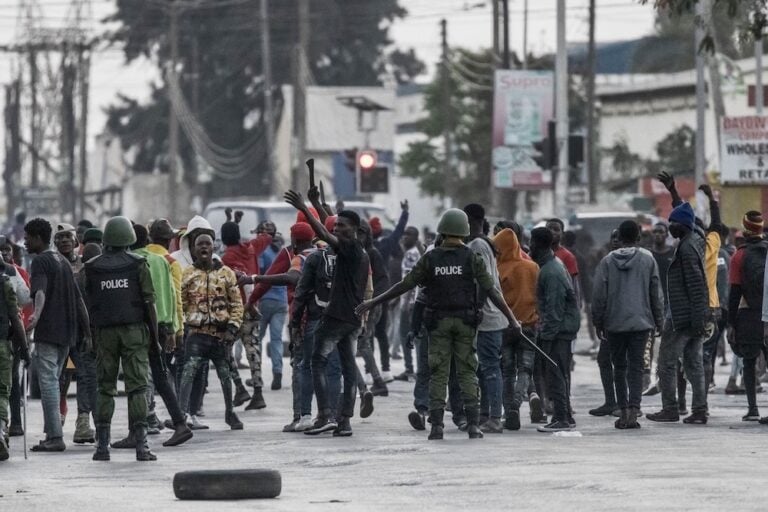(MISA/IFEX) – On 6 January police barred four journalists from covering a habeas corpus hearing challenging the continued house arrest of former Zambian president and now opposition leader Kenneth Kaunda. Jowie Mwiinga of Reuters, Katongo Chisupa of Agence France Presse (AFP), Musengwa Kayaya of the Pan African News Agency (PANA) and Kalinda Shachinda of the […]
(MISA/IFEX) – On 6 January police barred four journalists from covering a
habeas corpus hearing challenging the continued house arrest of former
Zambian president and now opposition leader Kenneth Kaunda. Jowie Mwiinga
of Reuters, Katongo Chisupa of Agence France Presse (AFP), Musengwa Kayaya
of the Pan African News Agency (PANA) and Kalinda Shachinda of the state
owned Zambia Daily Mail were reportedly blocked because the”court room was
full”.
Chisupa told the Zambia Independent Media Association (ZIMA) on 7 January :
“We arrived an hour before the proceedings, showed the police our press
passes, but they simply refused to let us in claiming that the court,
including the press gallery, was full…We didn’t believe this claim, did
our best to protest, but our appeals fell on deaf ears. Several of our
colleagues later disputed the police claim that the press gallery was full,
saying it had a number of empty seats..” In a separate interview, Mwiinga
expressed regret at the incident.”Justice must not only be done, it must be
seen to be done…..if they (police) keep the media out of the present
proceedings,
the public will not be able to judge whether justice is being done,” he
said. Mwiinga added that his professional rights as a journalist to cover
the event and his private rights as a member of the public to witness the
proceedings were both infringed by the police in this incident.
ZIMA chairman David Simpson said the police action was a grave violation of
press freedom and their excuse for barring the journalist was
unsatisfactory. “The reasons advanced by the authorities, that the reporters
were denied entry into the courtroom because it was full, are unbelievable
and can best be described as lies….. This (incident) brings home the
indisputable
fact that Zambia needs elaborate constitutional provisions of freedom of the
press. Such provisions would settle, once and for all, arguments about how
far freedom of the press can be exercised in Zambia,” he said.
On 2 January, CNN cameraperson Amy Merz was injured in the wrist and had
her camera damaged as police attempted to apprehend her and her colleague
Bob Coen on suspicion that they had interviewed Kaunda in court. Kaunda is
barred, under a statute signed by President Frederick Chiluba on 31 December
1997 placing him under house arrest, from speaking to the
press or engaging in any political activity. He was arrested and detained
without charge in December, suspected of involvement in an attempted
military coup of October 28 spearheaded by junior army officers led by
captain Stephen Lungu.


